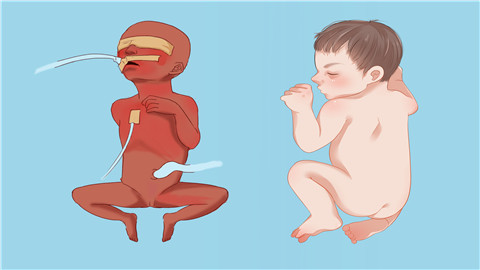What to do about poor thermoregulation in premature infants
In general, the main reasons for poor thermoregulation in premature infants include thin subcutaneous fat, low brown fat stores, inappropriate environmental temperature, infections, and hypothyroidism. At this time, general treatment, physical therapy, or drug therapy may be selected as appropriate under a doctor's guidance. The specific analysis is as follows:
1. Thin Subcutaneous Fat
At birth, premature infants have underdeveloped and thinner subcutaneous fat layers compared to full-term infants. This causes body heat to be easily and rapidly lost through the skin, making it difficult to maintain a stable body temperature. In daily care, premature infants should be placed in incubators or warming beds, maintaining the environmental temperature between 24-28°C. The infant should also be wrapped in soft cotton clothing to reduce heat loss. When changing clothes or diapers, movements should be quick to avoid prolonged exposure of the body.
2. Low Brown Fat Stores
Brown fat is an important tissue responsible for heat production in newborns. Premature infants often have insufficient brown fat reserves, resulting in weak heat production capacity. When exposed to cold environments, they are prone to a drop in body temperature. Kangaroo care can be used, placing the premature infant close to the adult's chest to utilize the adult's body heat for warmth, while also promoting activation of brown fat for thermogenesis. If necessary, a radiant warmer may be used to maintain the core body temperature between 36.5-37.5°C.

3. Inappropriate Environmental Temperature
Premature infants are sensitive to changes in environmental temperature. An excessively cold environment can lead to rapid heat loss, while an overly hot environment may cause dehydration and metabolic disturbances, both of which increase the burden on thermoregulation. A thermometer and hygrometer should be used to monitor the environment, maintaining humidity between 55%-65%. The parameters of warming devices should be adjusted according to the infant's weight—for example, for premature infants weighing less than 1500g, the incubator temperature can be set at 32-34°C. Sudden temperature fluctuations should be avoided.
4. Infection
The immune system of premature infants is underdeveloped, making them susceptible to bacterial or viral infections. Following infection, the body's metabolism becomes disordered, leading to an imbalance between heat production and heat loss, which results in fluctuating or persistently low body temperature. Strict hygiene measures should be taken when caring for premature infants, including thorough handwashing and disinfection before contact. If an infection is diagnosed, antibiotics such as sodium penicillin for injection, ceftriaxone sodium for injection, or vancomycin for injection may be used under medical guidance to control the infection. Simultaneously, warming equipment should be used to maintain stable body temperature.
Some premature infants may have incomplete thyroid development, leading to hypothyroidism and insufficient secretion of thyroid hormones. This results in a reduced metabolic rate and decreased heat production, manifesting as poor thermoregulation. Thyroid function tests should be conducted under a doctor's guidance. After diagnosis, hormone replacement therapy may be administered using medications such as levothyroxine sodium oral solution, levothyroxine sodium tablets, or thyroid extract tablets. These should be used in combination with warming measures to improve the infant's temperature regulation.
In daily life, the body temperature of premature infants should be closely monitored, with measurements taken every 1-2 hours. Frequent opening of the incubator door should be avoided to minimize fluctuations in environmental temperature. Adequate milk intake should be ensured during feeding to provide the energy required for thermogenesis. Regular growth and development assessments should be conducted, along with monitoring of thyroid function and infection indicators, to ensure the healthy growth of the premature infant.




